| Chris Ryba-Tures |
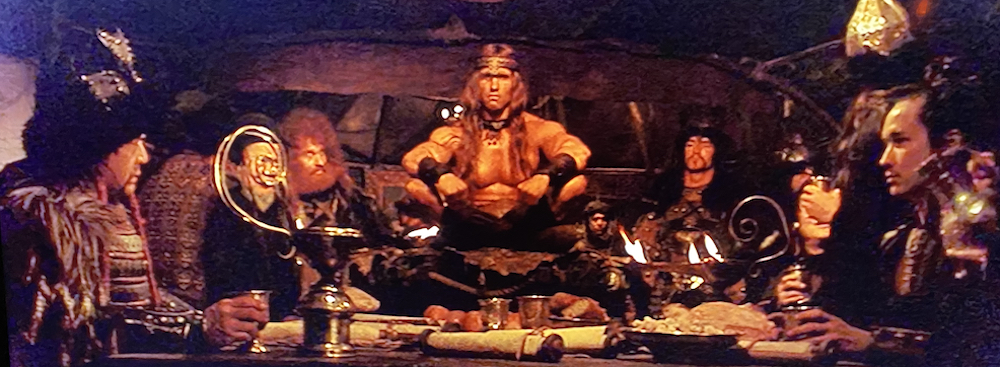
Conan the Barbarian plays at the Trylon Cinema from Friday, April 5th, through Sunday, April 7th. Visit trylon.org for tickets and more information.
“My fear is that my sons will never understand me,” says the Khitan General, his war council babbling all around him while the stone-faced barbarian, Conan, sits cross-legged on a table centered in their yurt. It feels like a throwaway line at first, a bit of conversational texture grunted out by a Hyborean stand-in for Ghengis Khan. But considering that Oliver Stone and John Milius penned this 1982 sword and sorcery classic, Conan the Barbarian, I’m reluctant to dismiss any of the scant dialogue outright.
The General’s line always jumped out at me, even when I was only watching Conan for the swords and the sorcery and the Schwarzenegger. It’s one of those serious, soul-deep thoughts, spoken to no one and everyone at the same time; a thought that can only be safely expressed in the din of barrooms and sporting events and the fog of war, where human vulnerability is obliviated under the juggernaut of hyper-masculinity and honorable violence. The General’s introspective moment is brief, cleaved by news of a military victory, and with it, a flood of macho posturing.
“This is good, but what is best in life?” the General shouts to his retainers. After one of his officers proffers a pretty good (but embarrassingly wrong) answer, the General turns to Conan for the most quotable, the machoest, and the rightest answer:
“To crush your enemies, [to] see them driven before you, and to hear the lamentations of their women.”
Under this mighty incantation, we forget that the General mentioned anything about his fears or his sons at all—bring on the beefcakes and the bloodshed! But the line deserves our attention. On the surface, Conan is the story of an orphaned Northman seeking revenge to become a hero. But just beneath the slashing blades and roiling revenge that wrap our attention for most of the film are the tendons connecting the surface action to the bones holding it all up: the relationships between fathers and their children—in particular, their sons.
I may be reading too much into this thick slice of pulp fiction, but bear with me. Raised in the 1980s, when wrestling and action figures modeled XXL masculinity, I hold a well-muscled association between Arnold Schwarzenegger movies and my dad. Arnold’s were the kind of R-rated movies my dad didn’t have a hard time letting me watch well before I was of age. They weren’t serious, they weren’t realistic, and man were they fun—especially for an imaginative 10-year-old with a hardcore Nintendo addiction.
There was no one like Arnold: a living superhero inhabiting outsized fantasy worlds worthy of his Olympian physique and nuclear-grade charisma. He dealt in swords, bazookas, aliens, robots, terrorists, and equally deadly puns. On my insistence, my dad and I wore out an edited-for-TV VHS compilation of one-word title Arnold movies: Predator, Commando, and (The) Terminator. Shortly before I started junior high, my dad treated us to the uncut, real-with-the-capital-R versions, with all the blood and bullets and swearing and odd-numbered bare breasts a pre-teen could hope for.
There was a bit of a ritual to watching these Arnold movies. When my dad got home from the video rental place next to the liquor store where he picked up his monthly case of Old Milwaukee, there was a kind of silence in his presentation of the tape; an unspoken communication that we were crossing a threshold together. He was inviting me into his confidence, entrusting me with an experience most of my peers would not get to have for a few more years (at least the ones without cable). Then came contextualizing and level-setting about what types of scenes would shut down the movie (usually sex stuff). He’d make popcorn on the stove and listen to me gush over what I knew about the Arnold movie we were about to watch, previous ones we’d seen, or other movies, shows, and video games that were obsessing me at the moment. In turn, he would tell me about the movies that thrilled him when he was a kid in the 50s, the actresses he crushed on and the actors who inspired him, the nightmarish giant ants of Them!, and the stirring climax of Spartacus.
There was a particular closeness I felt with my dad in these exchanges, where the hard borders of the parent-child dynamic disappeared and the distance of age shortened. Everything was simplified on common ground. We were connected and present to each other. I suspect, I hope, other children have had similar conversations with their fathers, whether about movies or sports or music or relationships or, in the case of Conan, the Riddle of Steel.
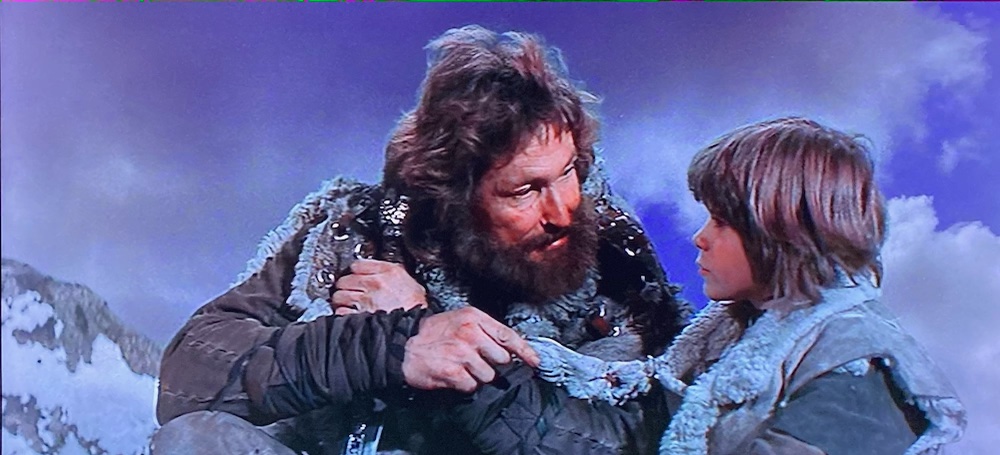
It’s a conversation like this, between the boy Conan and his father, that begins Conan’s tale of sorrow. The relationship we see here, albeit briefly, is what shapes Conan more profoundly than the Wheel of Pain, the gladiator pits, the poetry of Khitai, the companionship of Valeria and Subotai, or even the sinister influence of his nemesis, Thulsa Doom. Conan’s adventure is mile-marked not by conquest and kills or babes and beasts, but by fathers, true and false.
Actor William Smith plays Conan’s father not as a stone-faced war chief or grunting backwoods bruiser, but as a warm, well-spoken, spiritually grounded craftsman sharing wisdom with his young son:
“The secret of steel has always carried with it a mystery. You must learn its riddle, Conan. You must learn its discipline. For no one—no one in this world can you trust. Not men, not women, not beasts. [points to sword] This you can trust.”
It’s more than exposition or worldbuilding. Here is a father passing on his insight and experience, inviting his son to pass the threshold of adulthood on the faith that Conan will understand where they come from, and ultimately, understand him. But Conan’s father never gets to find out, not in this life at least. Soon he, Conan’s mother, and all the other adults in Conan’s tribe are ruthlessly slaughtered by Thulsa Doom and his raiders.
What follows is a physical transformation for the ages. Condemned to endlessly push the Wheel of Pain, Conan’s body becomes a heavily fortified temple of muscle and retribution. He is trained to become the ultimate killing machine for the profit of others, then is released after becoming “like a wild animal […] kept too long.” He becomes a verb: he runs, he slashes, he fucks, he makes a friend, he gets high on Black Lotus (Stygian, the good stuff), he punches a camel, he steals some jewels, he fights a big snake. He verbs with such force we willingly cast aside any thoughts of his interior life and join him in each grim and gratuitous action.
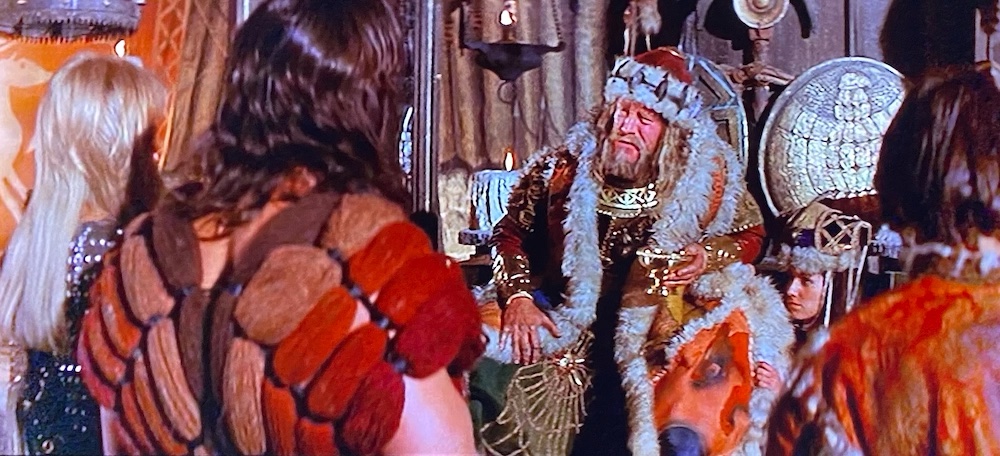
The next father we meet, after the more-custodial-than-parental slave master and the Khitan General, is King Osric. This one is a real heavy-hitter, played by the man who challenged death to chess and battled the devil: Max Von Sydow. Taking on the role after some loving encouragement from his Conan-adoring son, Von Sydow packs a lifetime of stale power and fresh regret into a Shakespearean three minutes of screentime as a father realizing far too late that…
“There comes a time, thief, when jewels cease to sparkle, when the gold loses its luster. When all that is left is a father’s love for his child.”
Once a powerful Northman like Conan, he is what Conan’s father might have been had he not been unjustly cut down. Von Sydow plays it with a heavy bark, like an old wolf with a little bite still left in him. With tired laughter and a voice dragged through gravel, his fatherly plea to steal back his daughter from Thulsa Doom at any cost hits a deeply compelling note. Neither Conan nor the audience need to be asked twice to chase down the enemy, even with promises of quick riches and comforts within reach.
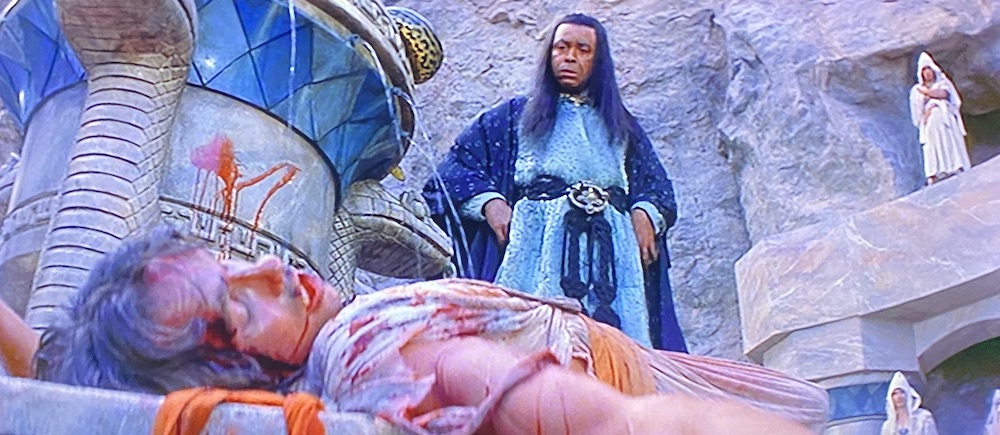
When Conan arrives at Thulsa Doom’s Mountain of Power more than an hour into the film, we get our first line of dialogue from Doom: “I see you.” An otherworldly, charismatic cult leader, played with deadly effective seriousness by the incomparable James Earl Jones, Doom is a spiritual father to his thousands of followers, the Children of Doom, who flock to him for easy answers and balm for their desperation. His voice—the timbre, the resonance, the command, the absolute certainty—hits with a force that matches Conan’s physical strength.
They’re soon brought face-to-face. Compared to Doom’s grace, self-possession, and introspection, Conan seems little more than a pathetic, grunting beast. As a gesture of fatherly pity before sentencing Conan to death, Doom gently commits a vulgar display of power as an object lesson in the Riddle of Steel:
“Steel isn’t strong, boy, flesh is stronger! […] What is steel compared to the hand that wields it? Look at the strength in your body, the desire in your heart, I gave you this! […] Contemplate this on the Tree of Woe.”
As Conan hangs crucified on said tree, we’re given the chance to really consider the forces that have made Conan what he is: Is he a barbarian beefcake by nature or by nurture? Is it the forces hammering on him from without that shaped him into what he’s become, or is it what he keeps deep inside himself, the fires lit by his father and stoked by experience, that drive him toward his destiny? We don’t contemplate long, as Conan uses his last bits of strength to verb some more. He eats a vulture alive, he hallucinates, he passes out, he gets rescued.
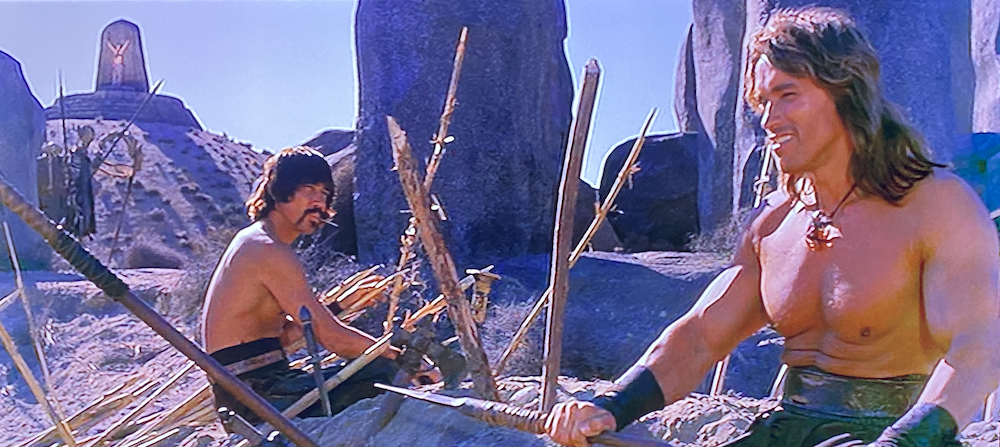
In the penultimate scene, we’re granted access to Conan’s personal temple of revenge. Layer after layer of protective brawn is pulled back to reveal a disarmingly peaceful memory:
“I remember […] when my father took me to the forest and we ate wild blueberries […] I was just a boy of four or five. The leaves were so dark and green then. The grass smelled sweet with the spring wind.”
Not hunting. Not forging steel. Not crushing enemies or hearing the lamentations of their women. Nothing remotely barbaric as we’ve come to understand the word. The fire that burns in the heart of Conan is something tranquil, sweet, and full of life—a scene from his childhood with his father, untouched by his life of “pitiless cumber.” This is our first real glimpse at Conan’s inner life, the inner child protected by hundreds of pounds of muscle, obsession, training, scar tissue, and battle frenzy. We see not only that he lost a father, but a peaceful life in the Cimmerian highlands with his father, his people, himself. Like the General’s comment, it’s a vulnerable, fleeting bit of dialogue, as fragile as the Conan the Boy within. And it’s one that’s quickly buffed out with the sharpening of a sword.
Conan’s final confrontation with Doom atop the Mountain of Power inevitably follows. It is not a clash of swords, but of wills, with Doom delivering a monologue of nuclear-grade, soul-wrecking existential brainwash that shakes Conan’s temple of revenge to its foundations:
“My child, you have come to me, my son. For who now is your father if it is not me? I am the wellspring from which you flow. When I am gone, you will have never been. What would your world be, without me? My son.”
For a moment, Conan is reduced to blank-faced idiocy: Can the boy within survive the grim task the Barbarian has come to perform? Standing there with a blade drawn and countless lives riven in his wake, is there anything left of that boy at all? Is this temple of revenge actually a prison? And if Doom is right, what then?
Conan snaps back to awareness. In answer, he cuts down Thulsa Doom, the false father, before all of his false children, and sets his holy temple ablaze. He drops his sword upon the temple steps. He carries a wayward daughter home.
Somewhere in Valhalla, I’d like to think, a father smiles.
